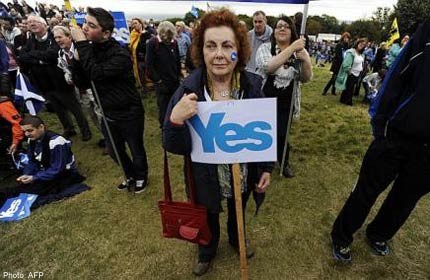Scotland sets out plan to break with Britain

SCOTLAND could be independent on March 24, 2016, if voters back leaving Britain in a referendum next year.
The date is included in a Scottish government policy paper, described as a "blueprint" for independence, the details of which were published on Tuesday.
Unveiling the 670-page white paper, Scotland's First Minister Alex Salmond said in Glasgow that an independent Scotland would keep the British pound and remain in the European Union. But it would have its own military force and collect its own taxes.
"Scotland's future is now in Scotland's hands," he said at the release of the document, aimed at persuading Scots they should vote on Sept 18 next year to end their 306-year union with England.
"We know we have the people, the skills, and resources to make Scotland a more successful country," said Mr Salmond, the leader of the Scottish National Party and the head of Scotland's autonomous government.
He gave the assurance there would be no need to raise taxes and that Scotland's oil and gas reserves would prop up the economy if it broke away.
Deputy First Minister Nicola Sturgeon further described the document as "the most comprehensive and detailed blueprint ever drawn up for a prospective independent country".
British Prime Minister David Cameron's coalition government is campaigning to keep the union intact. The opposition Labour Party is also against a split-up.
Mr Danny Alexander, Chief Secretary of the British Treasury, has demanded clearer answers on how the Scottish government plans to "balance the books in an independent Scotland".
The latest opinion polls conducted by The Scotsman, the leading local daily, indicate that only 29 per cent of Scottish voters back independence. Still, the Scottish National Party is undeterred.
Given the widespread scepticism about separation, the document claims both that Scottish independence is historically important and that, once obtained, it won't change anyone's life and won't cost much either.
The document reassures Scots that they would continue to enjoy more welfare benefits than the rest of Britain, such as almost free university education, no charges for health care and generous maternity leave.
All this would be funded without a rise in taxes because Scotland will no longer have to share its oil revenues.
Scotland, the document further assures, will also remain in the European Union, and its people could retain British passports.
The British monarch will remain head of state and, although the Scottish government plans to establish its own national army, it claims that this will be cost-neutral since it will be paid "by diverting the money currently spent by the UK" on nuclear weapons.
Critics will not find it difficult to challenge these arguments.
Calculations recently made by the Institute of Fiscal Studies, an independent think-tank, indicate that an independent Scotland would face a "fiscal gap" of 1.9 per cent of national income in its expenditure, compared to 0.8 per cent for Britain at the moment.
Mr Alistair Darling, leader of the pro-union Better Together campaign, said these figures leave the Scottish government's economic case for independence "in tatters".
Research conducted by Britain's Parliament into the eventual creation of an independent Scottish army and a network of overseas embassies also show that the costs will be substantially higher than claimed. And Scotland will have to apply to join the European Union; it cannot become a member automatically as is assumed.
But the biggest dispute will centre on the claim that Scotland could be independent yet still retain the British pound as its currency. The government in Edinburgh is forced into this curious stance because opposition to the adoption of the euro is strong, and the introduction of a separate Scottish currency lacks credibility.
But whether the Scots can continue use the British pound is for the government in London to decide. Mr Darling, leader of the Better Together campaign, has already said that the maintenance of a currency union is a "non-starter".
Given all these difficulties, the decision by the Scottish government to publish its independence blueprint appears to have backfired. Still, Mr Salmond is a shrewd politician. He knows that the policy paper may not persuade many, but the publicity itself could sway people to turn out to vote, and that also helps his case.
More importantly, he calculates that the more outrageous his independence claims are, the more they are likely to provoke a backlash from England which, in turn, will feed into Scotland's sense of alienation from the rest of Britain.
The blueprint's publication is, therefore, part of his psychological warfare with London.
Ultimately, the Scottish government's strategy is not so much to win next year's independence referendum but, rather, to lay the foundations for a longer battle which is guaranteed to begin immediately thereafter for a second independence referendum.
London may think in terms of a few years but Mr Salmond, a fiery nationalist, is dreaming about the centuries to come.
jonathan.eyal@gmail.com

Get a copy of The Straits Times or go to straitstimes.com for more stories.